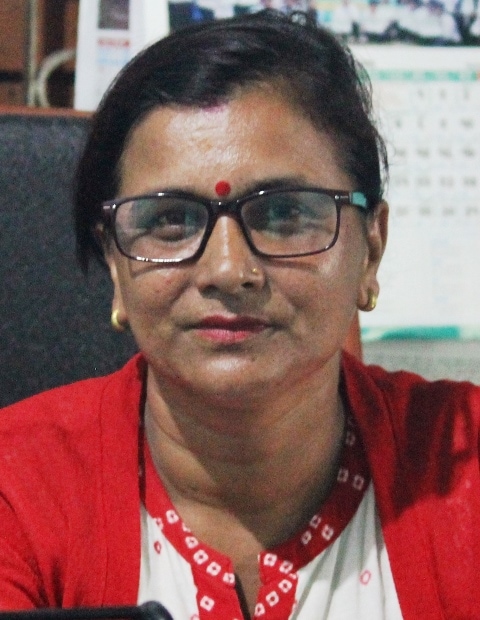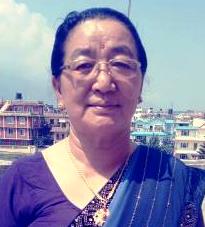Women ward chairpersons, who number 53 across the country, are facing bigger and different troubles compared to their male counterparts. One woman ward chairperson says: “When we demand budget, we are perceived to be complaining. When male ward chairmen ask for funds, it’s believed to be their right. That’s the difference.”
Parbat Portel : Centre for Investigative Journalism-Nepal
Haldibari Ward 3 Chairperson Roshan Shiwakoti in Jhapa had difficulty in getting the ticket from then-CPN-UML party. She was somehow chosen the party candidate but another party member, Tanka Bhattarai stood as a rival candidate. Some of the party workers in the ward supported Bhattarai but Shiwakoti won the election with a margin of 144 votes.
 “The dispute arose when I refused to go against the law. They forced me to agree just because the disputing party happened to be a male.”
“The dispute arose when I refused to go against the law. They forced me to agree just because the disputing party happened to be a male.”
Roshan Shiwakoti, Ward Chairperson, Haldibari Rural Municipality, Jhapa
Less than six months of taking charge as the ward chairperson, Shiwakoti was accused of corruption. “I learnt that a complaint was filed against me in the Commission for the Investigation of Abuse of Authority of ‘misappropriating 1 million rupees without doing any work’. I got a shock when a CIAA team arrived for monitoring,” she says.
“Actually, roads were being made continuously and monsoon floods were sweeping away portions,” she said. “I had directed the consumer committee to divert funds from one road to a crumbled stretch.” That was the reason she had to defend the corruption case. The watchdog’s team gave her a clean chit in the summer of 2018 citing a “lack of evidence”.
Shiwakoti faced other troubles too. Former village development committee vice-chairman Santalal Meche visited the ward office in the third week of December, 2018 for citizenship recommendation. Meche had an argument with the staff. He also quarreled with Shiwakoti. “I had asked him to complete the formality, the recommendation would be ready. But he held up the chair and prepared to attack,” said Shiwakoti.
She filed a complaint of misbehaviour with the local judicial committee against Meche. Dambar Giri, rural municipality vice-chairperson and coordinator of the judicial committee, got them to sign an agreement on the condition of not repeating the mistake in future. “The dispute arose when I refused to go against the law. They forced me to agree just because the disputing party happened to be a male,” said Shiwakoti. Rural municipality Chairman Dambar Giri pleaded for not blowing the incident out of proportion since an agreement had been reached.
Discrimination in budget allocation
Kamala Thulung, Bhadrapur Ward 3 chairperson in Jhapa, has found that women representatives don’t find their work as easy as men’s since they don’t go out of office easily to meet people. “If we attended contractors’ liquor parties, we would find programme implementation easy. Since we don’t do that, who would respond to us, who would help us out?” Thulung shared her experience. She believes that her ward has got a smaller budget just because she happens to be a woman.
“When we demand budget, we are perceived to be complaining. When male ward chairmen ask for funds, it’s believed to be their right. That’s the difference,” Thulung said.
Birtamod 9 chairperson in Jhapa, Pabitra Pathak shared her bitter experience of not being helped by the mayor in developmental and other activities in her ward. Pathak finds a trend of women ward chairpersons being stopped from work and not being trusted easily. “We can’t pat the mayor on his shoulder like a friend and demand budget for the ward. Since we claim our authority within the system, we are being disregarded,” she shares.
Similar is the story of Birhangma Rai, the Phidim Municipality Ward 10 chairperson in Panchthar representing the Nepali Congress. The workers of her own party went against her during the election. “Even today, some are active criticizing me and creating trouble. But I’ve stopped minding them,” said Rai.
Bhima Devi Ojha, Ward 5 chairperson in Phungling Municipality of Taplejung, feels that the town leadership has totally ignored her area in budget allocation. Her ward is smaller compared to others but Ojha believes that is not the only reason. “The discrimination is due to the patriarchal mindset of the leadership,” she said.
Urmila Thebe, Ward 1 chairperson of Sirijanga Rural Municipality in Taplejung, also feels sidelined. In the fiscal year 2017-18, she had demanded Rs 3.2 million from the information and communication ministry to run computer classes in Sinam Secondary School in her ward. While her proposal was held up for long, she found that other schools had received budget under the heading. “After several visits, I got the budget this year. They had brushed me aside as a woman but I’m defiant.”
Chinimaya Tamang, Ward 9 chairperson in Khandadevi Rural Municipality of Ramechhap, set aside Rs 300,000 for water pipe after her election more than two years ago. She had planned to purchase the pipe on her own in order not to pay a commission in the process. But workers of her Nepal Communist Party (NCP) prevented her from buying pipe. They forced her to entrust them with buying the pipes and the distribution. “They put pressure on me saying that they had taken troubles for electing me while I wanted to do everything on my own. I then relented,” Tamang said.
Hurdles in project execution
Two and a half years ago, Pashupati Chaudhary was excited to take responsibility as the chairperson of Triyuga Municipality Ward 13 in Udaypur. But the local residents refused to clear the plot where the municipality had planned to build the ward office. “I had not anticipated non-cooperation even for the building of the ward office,” said Chaudhary.
She stumbled on the very first step but she went ahead with allocating Rs 500,000. Locals including Shumbhu Raut protested the move. Raut argued that the spot had long been used to tether cattle. But Chaudhary defied all odds to repair the ward office. “Had there been a male chairperson, he would not have to pay attention to such things. Nobody would defy him,” said Chaudhary.
In another incident, Chaudhary has allocated Rs 500,000 in the current fiscal year to build a culvert behind the Laxmipur School in the ward. “But the members of my own party [NCP] protested. But the culvert construction has been halted as the residents argued that building a retention wall in the paddy field of social worker Hem Narayan Chaudhary is more important.
Triyuga Deputy Mayor Devi Kumari Chaudhary said the construction was halted following the registration of a complaint at the District Administration Office that the town development office had already built a culvert there. “I don’t think the ward chairperson faced disturbances just because she’s a woman,” said Chaudhary.
Facing mistreatment
All the four women members of Ward 4 in Karaiyamai Rural Municipality in Bara of Province 2 are from the Nepal Communist Party while one member (mail) represents the Nepali Congress. “While NCP members hold a majority in the ward, Congress member Harindar Sah Kanu can bully them,” Aftab Alam, the son of ward chairperson Janawi Khatun, complains. “They treat our mother as a dummy chair.”

“After several visits, I got the budget this year. They had brushed me aside as a woman but I’m defiant.”
Urmila Thebe, Ward Chairperson, Sirijanga Rural Municipality, Taplejung
A ward meeting held in summer last year decided to extend the electricity connection to Thulo Lauchan. But male ward member Harindar Sah opposed the decision. “It wasn’t limited to that. He incited [individuals] to attack ward chairperson Janawi Khatun, and members Sayara Khatun, Tetari Khatun and Chanda Devi, who had reached there for extending the electricity supply,” said Alam. Following the incident, the representatives including the ward chairperson filed a complaint at the Bara District Administration Office. But the office summoned the disputing sides and got them to reconcile. “Ward member Harindar’s behaviour hasn’t changed,” Chair Khatun says. “He has no responsibility except creating obstacles in every development work and inciting people.”
Ward member Harindar Sah, however, denies any wrongdoing in the incident. “They have a majority. I protested when they did everything unilaterally,” Sah argues.
Women ward chairpersons have similar complaints in Sudurpaschim Province. The municipal assembly of Gauriganga Municipality in Kailali last year decided Rajipur as the centre of Ward number 4. Ward member Gopal Prasad Chaudhary, however, objected to the decision. He insisted that the ward centre should have been near his neighbourhood. “He pressed for announcing a place not meeting the standards as the centre. We didn’t comply,” Ward chairperson Bhagarathi Bista says.
Bista alleges that people including Dirgha Sunwal and Bharat KC had incited Chaudhary to oppose the decision of fixing Rajipur as the ward centre. Sunwal and KC, who come from the former UML party, challenged the decision of the municipal assembly in the Dipayal High Court. But the high court ruled in favour of the assembly. Mayor Bhim Bahadur Deuwa said: “This no longer remains a big issue as the dispute has been settled and even the ward office built.”
The six metropolitan cities, 11 sub-metropolitan cities, 276 municipalities and 460 rural municipalities of the seven provinces have 6,743 wards in total. According to the Election Commission, the number of women ward chairpersons is 53. Province 1 has 12 women ward chairpersons, Province 2 has 9 women chairing wards, Bagmati has 6 women on the ward chairs, Gandaki has 13, Province 5 has 6, and Karnali has 3 women ward chairpersons while the number of women holding ward chair posts in Sudurpaschim is 4.
Mohna Ansari, a member of the National Human Rights Commission, says women ward chairpersons are facing discrimination across the country. “There is a culture of undermining women for socio-economic reasons. They are not trusted as much as male people’s representatives. This has victimized elected women,” says Ansari.



